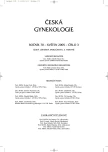Influence of Exogenous Supplementation with Luteinizing Hormone during Controlled Ovarian Hyperstimulation on the Results of IVF Cycle
Vplyv exogénnej suplementácie luteinizačného hormónu počas kontrolovanej ovariálnej hyperstimulácie na výsledky cyklu IVF
Cieľ štúdie:
Objektivizovať vplyv exogénnej suplementácie luteinizačného hormónu (LH) v cykloch in vitro fertilizácie s použitím depotného agonistu GnRH, pri nízkych hladinách reziduálnej endogénnej LH aktivity.
Typ štúdie:
Prospektívna randomizovaná klinická štúdia.
Názov a sídlo pracoviska:
II. gynekologicko-pôrodnícka klinika LF UPJŠ a FN LP Košice.
Metodika:
V prospektívnej randomizovanej klinickej štúdii sme hodnotili dopad exogénnej suplementácie LH na výsledky asistovanej reprodukcie. Do súboru bolo zaradených 68 cyklov asistovanej reprodukcie s použitím dlhého protokolu s depotným agonistom GnRH, stimulovaných rekombinantným folikulostimulačným hormónom, u ktorých bola v strede stimulácie zistená nízka reziduálna hladina endogénneho luteinizačného hormónu (pod 0,5 IU/l). Následne boli cykly randomizované do troch skupín, pričom v jednej sa pokračovalo v stimulácii čistým FSH, v druhej skupine bola pridaná LH aktivita vo forme menotropínového produktu a v tretej rekombinantný LH.
Výsledky:
V oboch skupinách s pridaním exogénnej LH aktivity bolo zistené zlepšenie všetkých sledovaných parametrov, i keď štatisticky významný bol len rozdiel medzi dávkou použitého FSH, avšak nárast počtu gravidít o viac ako jednu pätinu, nadobúda klinickú významnosť.
Záver:
Na základe výsledkov štúdie nemožno jednoznačne dokázať význam exogénnej suplementácie LH aktivity pri nízkych reziduálnych hladinách endogénneho LH. V budúcnosti by bolo vhodné selektovať cykly s potrebou exogénneho LH na základe iných parametrov, nielen na základe sérových hladín LH.
Kľúčové slová:
IVF, luteinizačný hormón, kontrolovaná ovariálna hyperstimulácia
Authors:
S. Toporcerová 1; R. Hredzák 1; A. Ostró 1; V. Ždilová 1; D. Potočeková 2
Authors‘ workplace:
II. gynekologicko-pôrodnická klinika LF UPJŠ a FN L. Pasteura, Košice, prednosta doc. MUDr. A. Ostró, CSc.
1; Ústav lekárskej informatiky LF UPJŠ, Košice, prednosta ing. A. Červeňák
2
Published in:
Ceska Gynekol 2005; 70(3): 187-191
Category:
Original Article
Overview
Objective:
To evaluate the effect of exogenous luteinizing hormone in in vitro fertilization cycles with depot GnRH agonist and low residual LH levels.
Design:
Prospective randomized clinical trial.
Setting:
2nd Department of Gynecology and Obstetrics, Medical Faculty and L. Pasteur University Hospital Košice
Methods:
In the prospective randomized clinical trial the effect of exogenous LH on outcomes of assisted reproduction was evaluated. The total number of 68 in vitro fertilization cycles in normogonadotrophic women undergoing assisted reproduction with GnRH agonist down-regulation and recombinant FSH controlled ovarian stimulation were included. In all cycles the low residual LH level in the middle of stimulation was detected. The cycles were randomized into three groups. The first group was stimulated with pure recombinant FSH. In the second group the exogenous LH activity in the form of human menotrophin was added. And in the third group the human recombinant LH was added.
Results:
Better outcomes of assisted reproduction were detected in both groups with exogenous LH activity. But these results, except the dosage of FSH, were not statistically significant. The increase of pregnancy rate by more than one fifth in these both groups can be considered as clinically relevant.
Conclusions:
It can not be positively proved at the base of our results that exogenous LH activity in cycles with low residual LH level can improve outcomes of assisted reproduction. It could be appropriate in the future to select women that can profit from exogenous LH activity according to other parameters not only to the LH serum level.
Key words:
IVF, luteinizing hormone, controlled ovarian stimulation
Labels
Paediatric gynaecology Gynaecology and obstetrics Reproduction medicineArticle was published in
Czech Gynaecology

2005 Issue 3
-
All articles in this issue
- Premature Separation of the Placenta – Etiology and Risk Factors
- Nalbuphine in Obstetrical Analgesia
- Changes of Coagulation Parameters during Stimulation in the IVF Programme and in Ovarian Hyperstimulation Syndrome
- Influence of Exogenous Supplementation with Luteinizing Hormone during Controlled Ovarian Hyperstimulation on the Results of IVF Cycle
- The Map of Superficial Lymphatic System of the Breast and Relation to the Sentinel Lymph Node
- On the Problem of Sentinel Lymphatic Nodes Examination in Mammary Cancer
- Histological Grade in Management of Carcinoma of Endometrium
- Reconstruction Procedures Following Pelvic Exenterations
- Metastasing and Relapsing „Low Grade“ Adenosquamous Metaplastic Breast Cancer – is There a Really Indolent Lesion? A Description of Three Cases and Review of Literature
- Immune, Inflammatory and Hormonal Changes in Connection with Laparoscopic Surgery
- Changes in Urethra Mobility after TVT Operation
- Laparoscopy in Chronic Pelvic Pain – a Prospective Clinical Study
- „Mixed“ and „Miscellaneous“ Vulvovaginitis: Diagnostics and Therapy of Vaginal Administration of Nystatin and Nifuratel
- Fistula as a Complication of Pelvic Actinomycosis – Two Case Reports
- Czech Gynaecology
- Journal archive
- Current issue
- About the journal
Most read in this issue
- Nalbuphine in Obstetrical Analgesia
- Premature Separation of the Placenta – Etiology and Risk Factors
- „Mixed“ and „Miscellaneous“ Vulvovaginitis: Diagnostics and Therapy of Vaginal Administration of Nystatin and Nifuratel
- Metastasing and Relapsing „Low Grade“ Adenosquamous Metaplastic Breast Cancer – is There a Really Indolent Lesion? A Description of Three Cases and Review of Literature
